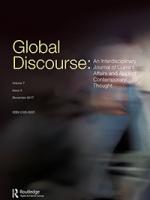What happens when securitization theory meets islamism?
In a recent contribution to the larger debate on how to increase the cultural sensitivity in IR analyses, Sheikh reflects on how the securitization theory can face some of the criticism relating to its embedded-ness in the West. The article shows that the expanding empirical application of securitization theory by scholars around the world, as well as the theoretical expansion (the opening of the religion sector of security) raise two important, but different questions, which are about potential a) limitations in the applicability of the theory on non-western cases, and b) west-centric biases in the design of the theory.
Sheikh's article sheds light on both types of criticisms by asking whether securitization theory is applicable to study the case of religious violence. First, it shows that the theory’s meeting with the Islamist case challenge the theory’s conceptualization of securitization as a defensive narrative only. Second, it points at the limitations in the way religion has been conceptualized by the theory’s proponents. Third, it argues that dealing with differences in the interpretations of political realities is an important element of the call to increased cultural sensitivity, and in this endeavour the securitization framework would gain from elements of worldview analysis.
DIIS Eksperter

